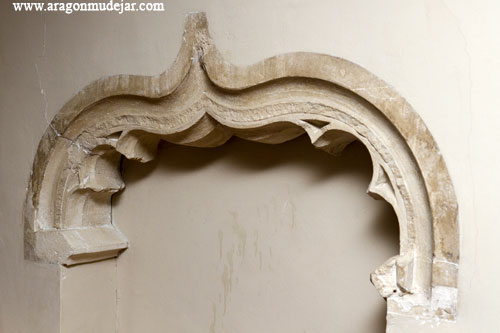|
webmaster: José Antonio Tolosa (Zaragoza -España-) |
|
|||||
|
|||||
THE ALJAFERÍA (ZARAGOZA) |
The last room corresponding to the Mudéjar construction time period of the palace is the one traditionally called “Saint Isabel’s Alcove” because of the unfounded story that the Infanta Isabel, daughter of Pedro III and queen of Portugal was born here. 2 One enters it, like the upper rooms of Pedro IV’s palace, by way of the antechamber or passage accessed by two staircases that it shares, one from the southeast angle of the Reception Hall, and the second in front of the big monumental staircase of the Catholic Kings’ Palace. 4 It is a little square alcove, built over the Islamic oratory, which is presently covered with an octagonal wooden cupola over pendentives. Previously, it constituted the third and the last of the three rooms of the Hall of the Pasos Perdidos, and it contained the narrow wooden strip that we can see in Pedro IV’s Salon, or “the one of the third molding.” To the right of the northern wall is the second room of the Salas de los Pasos Perdidos one can see the little closed up door through which one could enter. The entry to the alcove is gained through a narrow door with a double wooden sill of the period, restored from preserved parts, decorated with a framework of rectangles and squares. The most interesting part of this room is the Mudéjar decoration of openwork plaster that frames the interior of the upper part of the door, containing a pointed arch with a lobed intrados, framed by an alfiz. Both the alfiz and the spandrels are decorated with very fine motifs of vegetal arabesques rooted in the Hudí style, as well as the two little cupolas that have spiral patterns that are in the upper corners.
No documented chronology for the alcove has been found. It was closed off by Iñiguez when he reconstructed the cupola of the Islamic oratory, and cannot be presently visited. 8 10
On the same passageway, to the right of this room, an ogee arch was uncovered in the wall, which was part of a doorway that gave access to some of the rooms in the Mudéjar palace. 
|
| Ver estadísticas |